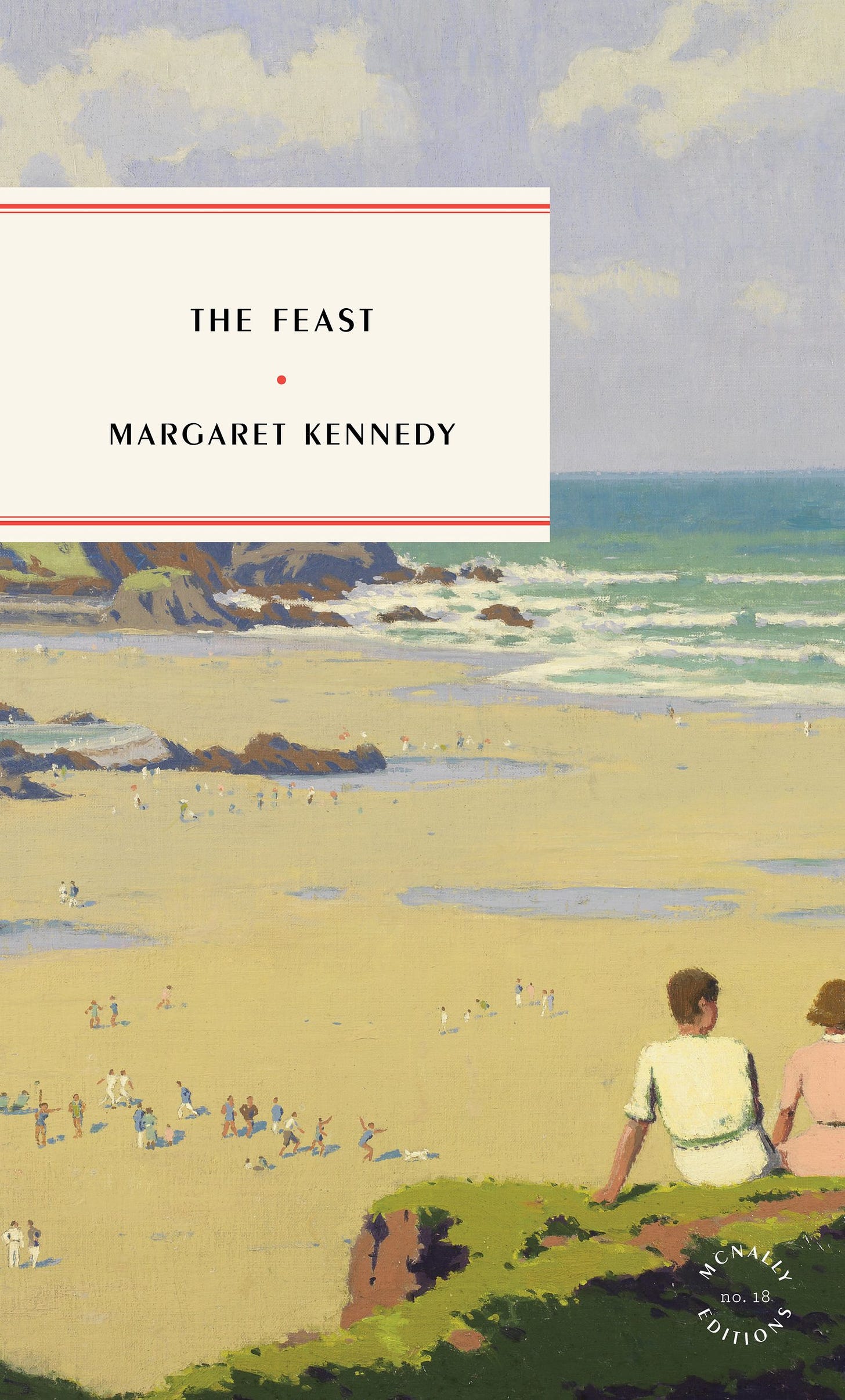Week 33 (2024)
boys, boarding school & selecting daughters, death, consolation & time in modern medicine, using the nice dishes, housing & fertility
Click title to open in browser.
You can reply directly to this email if received in your inbox.
to read: books
The Feast — Margaret Kennedy — Should have read Dominika’s brilliant write-up first, honestly. (linked below)
The Boy Crisis — Warren Farrell and John Gray — My thoughts.
to read: essays, articles, newsletters
"The Feast" By Margaret Kennedy —
, Gathering Light — “It is the children and adults scorned for being unrealistic who are truly grounded in reality. They are ultimately the ones who stand on firm ground high above the ruins of the hotel. They are the ones who see by the light of grace.”(related: 100 Days Of Dante and Glittering Vices (book), shared previously)
Why Don't Modern American Parents Want Boys? —
— “"One study found that white parents having a first child picked female embryos 70 percent of the time." …the practice of selecting for daughters raises complex ethical questions about parental expectations, societal values, and the role of technology in human reproduction.”(related and shared previously:
’s The Quiet Return Of Eugenics, Dr. Bradley’s substack, Heroic Fraternities book, podcast, Masculinity Course and Resource List)Let's Build Analog, Single-Sex Boarding Schools — Fr. Mark Perkins, Circe — “Because the habits and skills that make for lifelong success in any field are rooted in the person before being applied to any task and technology, let’s give our young people time and space to develop the attention, intelligence, reason, and responsibility necessary for human flourishing… And then let’s see what they build.”
(related and shared previously: this video for the school, found in the comments of
’s series—parts one, two, three—with a growing list of schools at The Repository, ’s The Case For Vocational Training, and Men Only Want One Thing, exploring the types of fatherhood, brotherhood, and discipline men desire and need)
- , Plough — “Prayer becomes urgent when you don’t have an endless number of days… I spend time in small, quiet rooms, getting through the next procedure, seeing only the moment, with an audience of my wife or a nurse… My existence has always been entirely dependent on God’s will; why should dependence on other people matter?”
The Consolation Of Death — Jay Martin, Church Life Journal — “Yet, Hippocrates leads us to an interesting inference… Any act of consolation is to console the dying.”
(related: The End Of The Christian Life (book) and Bring Back Hippocrates, shared previously)
Take Five — Brewer Eberly, Comment — “Here Mammon is especially insidious. Fee-for-service reimbursement rewards volume rather than outcome, prompting recent calls to align economic incentives to reward not just outcome but diagnostic accuracy and timeliness… modern medicine often feels like trying to speed up a favourite song.”
(related: his Three Challenges For Talking About Health, shared previously — other physician writers on here:
and )Memento Vivere — Christina Baker, Ekstasis — “As if the scars weren’t memory enough,
and I needed a memento mori:
a tiny, unfinished stigmata.”
The Baby Bust Isn't Just Political, It's Personal — Mary Eberstadt, First Things — “Beneath today’s furious insistence that proliferating childlessness is cost-free, reality says otherwise. The long-term consequences of today’s flight from marriage and children will be profound.”
(related: The Family Tree Stripped, shared previously)
Gary Becker On The Quantity And Quality Of Children — Matthias Doepke, Northwestern University — “…contemporary research on fertility in industrialized countries has often focused on aspects… such as the opportunity cost of female time and more generally the fertility-female employment tradeoff.”
(related: The New Malthusians and Hannah's Children (book), shared previously)
Natalism, NIMBYism, And J.D. Vance —
, Discourse — “Making housing more accessible would address the issues of fertility and family formation from an angle rather than head on—not by talking about them or treating them as floating, disembodied ideas, but by restoring a context in which starting a family doesn’t feel so out of reach.”(related: his follow-up, Escaping The Housing Trap (book), Arbitrary Lines (book), this from Strong Towns, Yes In My Backyard—And In My Frontyard, Why Catholics Should Resist NIMBYism, Markets & The Strangulation Of The American Family, shared previously)
Towards Full Enjoyment: Use The Nice Dishes — Patricia Patnode, Theology Of Home — “Life is too short to reserve beauty for rare moments… There’s a certain freedom in letting go of the fear that using something will diminish its value… I’ll let them bear the marks of a life well-lived, with all the scratches, chips, and wear that come from actually being part of my family’s story, not just a prop in it.”
to watch, listen to
The Collapse Of The Human Empire —
w/ , Maiden Mother Matriarch — This was the crossover I was not expecting, but actually makes a lot of sense.It was an honor hearing him speak up in Madison last fall, and a funny thing for my husband and I to have him, his wife and children sitting in front of us for one part of the conference. Kudos to his youngest for reading a sci-fi novel not only during another’s talk… but also for a portion of his dad’s. To our children, the accolades of others pale in comparison to who we are in relationship to them as parents. I’m sure simply being together on such an overseas trip was a valuable thing in itself.
Anyways…. tune in for a couple of the most sane and calming folks to listen to… about intense issues, ironically. Tie-in to the topic of fertility rates (mentioned in the links above) at the 23 minute mark. Around 32 minutes there’s a bold natural law observation from Louise—at least for a secular audience—which concludes that “if Christianity is true, that’s a very good thing. Because it means the Christian promise is true, as well.”
to glean from: tip, product, resource
This moody Dawn Treader and epic Reepicheep wall art were my favorite things we finally hung in the boys’ room. It’s pretty bare bones and roughed up, honestly. I cannot fathom spending inordinate amounts of time or money on nurseries, bedrooms, etc if you have a pack of little boys. If you know you know.
Biking — This very basic thing has given me some of the most life in recent months. My husband got my bike fixed after an accident over 5 years ago while first-trimester pregnant with our firstborn (Funnily enough, it was me turning around to laugh at something he was saying… that caused me to flip over in a crash.) Since then I’d been pregnant, then nursing, pregnant, then nursing, pregnant, then nursing… all with kids too young to ride a bike and also too numerous to fit in a trailer. Suddenly we have the ability to go out with the 4 year-old cruising on his peddle bike, 3 year-old on the balance bike (or in the trailer), and 1 year-old in the bike trailer we picked up used nearby. It is the literal best. I heartily recommend every aspect of the bike brigade. Go forth and ride, seeing your neighborhood or town in all its up-close glory!






![The Boy Crisis: Why Our Boys Are Struggling and What We Can Do About It [Book] The Boy Crisis: Why Our Boys Are Struggling and What We Can Do About It [Book]](https://substackcdn.com/image/fetch/w_1456,c_limit,f_auto,q_auto:good,fl_progressive:steep/https%3A%2F%2Fsubstack-post-media.s3.amazonaws.com%2Fpublic%2Fimages%2Fb45bc9b7-788a-4ec3-a6b0-0eb5945dcdf8_663x1000.jpeg)








Couldn't agree more with "Use the Nice Dishes." The most obvious (though low stakes) mistake we made with our firstborn was saving the prettiest dressed for special occasions and having the tags still on when we realized she outgrew them.
We now buy nice things we're prepared to lose and _use_ them.
I really like Addison DelMastro's writing, and I liked this article. But one of his points raises a question for me. He says that "pro-natalism" means being "pro-family" - but I'm wondering whether that's entirely accurate. Elon Musk, for example, considers himself (as far as I know) a pro-natalist, but he has many children with different women: not exactly 'family' in one traditional sense. So is pro-natalism the same as being pro-family, or is it actually more adjacent to it? It seems like most "pro-family" people end up being Christian, with a Christian sense of what family is. But is pro-natalism as a political position tied to Christianity at all? (I don't expect you to have all the answers! But wondering if your reading has led to any thoughts on this.)